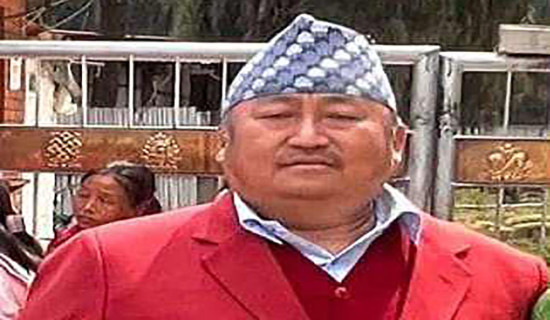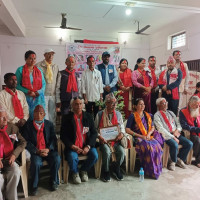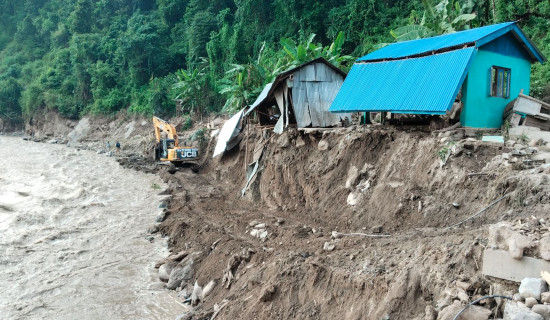- Thursday, 6 November 2025
Engaging Saga of A Pioneering Woman
Medical doctors tend to advise keeping blood sugar levels within the prescribed borderline. Ratan Bhandari, an accomplished author on matters of Nepal's borders, including some serious disputes with India, has now thought it appropriate to stay off borders, at least for the time being, and concentrate on research on other aspects too.
The book, Dwarikadevi Thakurani: Nepalki Pahilo Mahila Mantri, which can roughly be translated as Dwarika Devi Thakurani: First Woman Minister of Nepal, has an attractive cover with a sketch of Thakurani appropriately depicting her solid personality with steely determination and tenacity of purpose.
The book embodies an in-depth analysis of the role of a pioneering lady hailing from the backward area of Nepal's Far West Region. Dwarika Devi Thakurani was the only woman elected to the House of Representatives and the only woman candidate from the political parties despite five women fighting the first General Elections held in 1959. It may be recalled that Mangala Devi Singh was persuaded at the last moment to withdraw her name before Jagannath Acharya was fielded from Bhaktapur, possibly to avoid the unsavoury situation that befell the family in 1991 when both Mangala Devi Singh and Prakash Man Singh were defeated.
The book succinctly portrays the saga of the first elected member of Nepal's legislature as Thakurani who represented not only half of the population but also became the first woman Minister in Nepal's history. Besides, she was a social reformer marked by her inter-caste marriage at a time when such things were taboo in Nepal in general and Far West Nepal in particular. Thakurani presided over the first meeting of the parliamentary party of Nepal Congress, which received a two-thirds majority electing B.P. Koirala and Suvarna Shumshere as a leader and deputy leader.
The book is dedicated to seven pioneering women of the Far West who excelled in their lives through courage and valour is divided into six parts and 22 chapters with extensive appendices and a bibliography. Besides, three persons well conversant with Thakurani, Bhoj Raj Bhatt, Karna Bahadur Chand and Basudev Pandey, have written comments highlighting the life and role of the first lady minister of Nepal.
Bhandari's book has some important attributes that enhance its importance as it deals with a woman who suffered a lot even in her personal life and sacrificed everything for the sake of democracy, probity and transparency in the public domain. The book, based on extensive research, does not indulge in self-glorification unlike prevailing trends in the country nor does it accept any mysticism or hearsay accounts. While dealing with the subject, especially women's role in Nepal, it has drawn significant parallels and comparisons with other countries.
On page 17, the author includes a controversial statement from one top leader indicating that everybody needs orientation and even training in the field of foreign affairs before his or her assumption of responsibility to avoid unnecessary public utterances.
As expected, the book gives importance to the Far West Region of the country in terms of its role in the first General Elections with a special focus on women as the chapter on this score is the biggest. The book is also a virtual who's who of the Far West as we find several stalwarts mentioned, with my special interest in the people who mattered in diplomacy, like Foreign Secretaries and Ambassadors Jharendra Narayan Singha and Udhav Deo Bhatt, and other academics and diplomats like Dr Trailokya Nath Uprety and Dr Dibya Deo Bhatt.
The book portrays a host of people across the country who are distinguished in diplomacy, administration, judiciary, politics, and even the police. They include three Koirala brothers who became Prime Minister, Matrika, B.P. and Girija, Ratna Bahadur Bista, Anirudha Prasad Singh, Karna Bahadur Chand, Khadga Jit Baral, Purna Singh, Khawas, Gyan Bahadur Subba (Yakthumba), Rishikesh Shaha, Kshetra Bikram Rana, Mahendra Bikram Shah, Ram Hari Sharma, Yog Prasad Upadhyay, Ranadhir Subba, Dr Yadab Prasad Pant, Suberna Shumshere, Basudev Chandra Malla, to name only a few.
With all these positive features in the book, some points on the debit side could rather be addressed in the next edition. On page 3, there is the name Seeta Chalise, possibly referring to Sushila Chalise who finds mention on other pages. In terms of the contributions of female stalwarts to anti-Rana agitation, we hope the book includes some important names like Sita Sharma Nepal (spouse of Ram Hari Sharma), Annapurna Dhungana (wife of Chuda Prasad Sharma Dhungana) and Ishwari Sharma (best half of Jiba Raj Sharma), among others.
There are some obvious mistakes like Madhab Shah, then a student of Banaras Hindu University, on page 15 (most probably intended to mention Madhuri Shah who later married Narapratap Shumshere Thapa), and Maya Devi Shah (supposedly Maya Kumari Shah or Maya Kunwar Shah, spouse of politician, minister and ambassador Mahendra Bikram Shah) in page 18. There is also no need to repeatedly mention that Gorkhapatra was triweekly before it became a daily publication in 1961.
Some people like Dr Ishwar Baral are known by other formal names in the field of academic discipline. Dr Ishwar Baral is literary nomenclature while his actual name is Professor Leela Nateshwar Sharma Baral. Likewise, Barrister Nirmal Chandra Chatterjee (page 86) and Manmohan Mishra (page 103) could be identified as the modern generation as fathers of Speaker of India's Lok Sabha, Somnath Chatterjee, and Bhawani Rana, a reputed industrialist and businesswoman, respectively.
One interesting part of the story is that while the position of Deputy Minister did not survive for more than three days, the post of Deputy Prime Minister probably started as a one-time experiment in 1959, and seems to have flourished in Nepal beating all other countries in South Asia.
For example, India has so far appointed seven Deputy Prime Ministers lasting an accumulated period of only ten years. The same is the experience of Bangladesh with seven appointees for eight terms and Pakistan with only three examples. While the experiment seems to have practically been dropped in all three countries as of now, we seem to have developed a fertile penchant for this position on the part of both givers and takers, with little rhyme or reason.
In a nutshell, Ratan Bhandari has made an exemplary contribution in writing a research-oriented book depicting the glorious life of a great woman stalwart. I extend him cordial thanks and felicitations.
(Dr. Bhattarai is a former Foreign Secretary, ambassador and author.)







-square-thumb.jpg)

-original-thumb.jpg)






